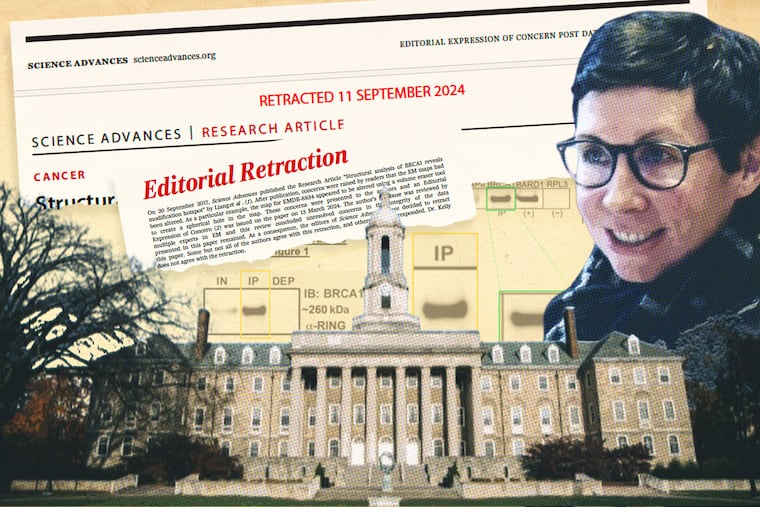Penn State bans scientist from doing research after investigation found ‘unreliable data’
So far, four of Deb Kelly's papers have been retracted from the scientific literature.

Penn State has taken the unusual step of revealing it has “indefinitely” prohibited a biomedical engineer from conducting research, after a review of her scientific papers found several contained “unreliable data.”
The investigation into the work of Deb Kelly was sparked by allegations that the data in some of the dozens of scientific papers she has co-authored appeared problematic. Penn State asked external experts to review her work, and they “confirmed the presence of unreliable data in several papers,” according to a university statement. The university has alerted the scientific journals that published the affected papers, as well as the federal agency that monitors research integrity.
“Dr. Kelly is currently employed at Penn State, but, as of May 2024, she is indefinitely prohibited from conducting research, pursuing grants or contracts, submitting publications, or making presentations on behalf of the Pennsylvania State University,” the university said in its statement.
Kelly did not respond to multiple requests for comment. A lawyer who submitted a letter on Kelly’s behalf to a scientific journal also did not respond to a request for comment.
It’s rare to see universities permanently strip researchers of their ability to conduct research — in part, because universities rarely make these sanctions public, said Ivan Oransky, co-founder of Retraction Watch, which tracks retractions and scientific misconduct, and first reported the investigation into Kelly’s work. Still, in the 14 years since Retraction Watch began, Oransky said he’s seen only a “couple” of permanent bans. “It is quite rare.”
What happened at Penn State “seems like an unusual case,” Oransky added.
In recent years, the scientific community has become more aware of the scope of misconduct in their ranks, and more transparent when it happens. Still, stories of outright fraud in science remain rare.
In Philadelphia, a Temple researcher came under fire in 2020 when his colleagues raised concerns about the validity of his findings, and several of his papers have since been retracted from the academic literature. (The researcher, Domenico Praticò, denied engaging in scientific misconduct.) Last year, a former longtime scientist at the University of Pennsylvania agreed to a seven-year ban on using federal funds to conduct research after an investigation determined that his lab had falsified data from experiments in pigs with brain injuries.
In comments to Retraction Watch, sent through her legal counsel and published in September, Penn State’s Kelly defended her work, and said she was “under no restrictions” in her research. In a subsequent comment to the outlet published later that month, also sent via her counsel, Kelly said that she was “embarking on new opportunities.”
Kelly is listed as the executive director of Structural Oncology LLC, which offers technical expertise to study the molecular underpinnings of disease, and says it is creating at-home rapid tests for some types of cancer.
Correcting the record
Kelly is a professor of biomedical engineering and the director of the Center for Structural Oncology at Penn State, where she used sophisticated imaging to visualize important components of cells. In 2022, she led a team that detailed the three-dimensional structure of p53, known as the tumor suppressor protein that protects DNA from damage that can lead to cancer.
Also in 2022, she served as president of the Microscopy Society of America. In June 2024, she appeared in a podcast series called “Speakers Who Get Results,” as a “trailblazer in medical research.”
As of the end of October, four of Kelly’s scientific papers have been retracted from the medical literature. The notice accompanying each retraction states that Kelly disagrees with the decision.
Several other papers by Kelly have been flagged as potentially problematic on PubPeer, a site where users discuss research articles after publication.
One retracted paper, published in 2021, was highlighted in an article on the website of Penn State’s College of Engineering, describing how Kelly’s lab visualized the three-dimensional movement of a virus, a technique that could be used to study vaccines and anti-viral treatments. After an inquiry from The Inquirer, the university added an editor’s note: “The article on which this story is based has been retracted. Following established research integrity processes conducted by Penn State, this paper was retracted by the journal.”
Bojana Gligorijevic, a professor and director of light microscopy in the bioengineering department at Temple University, declined to comment on Kelly’s work, but said these types of investigations — and fallout — can have an impact. “In general, cases like this tremendously affect mentees’ lives and career prospects, and lower [the] reputation of science in the society,” she said. “But the field can recover fairly quickly.”
Seeds of doubt
The statement from Penn State says the university launched an investigation into Kelly’s work after it was “made aware of the potential presence of unreliable data.”
For months, Thomas McCorvie, a senior research associate at Newcastle University in the UK, has been posting his concerns about Kelly’s work on PubPeer, noting that her papers appear to mix up what proteins they are describing. In one 2017 paper, for instance, “the authors appeared to have taken a 3D map of a different protein, edited it by deleting sections of it, and described it to be the breast cancer-associated protein BRCA1,” McCorvie said in an email. “Basically image duplication with editing.”
In other work from her lab, he said, the protein structures they present don’t look like proteins, and appear to include manipulations. Sometimes, the papers appear to reuse figures to describe different experiments in different publications, he added, noting that some of the alleged problems appear in research she published before coming to Penn State.